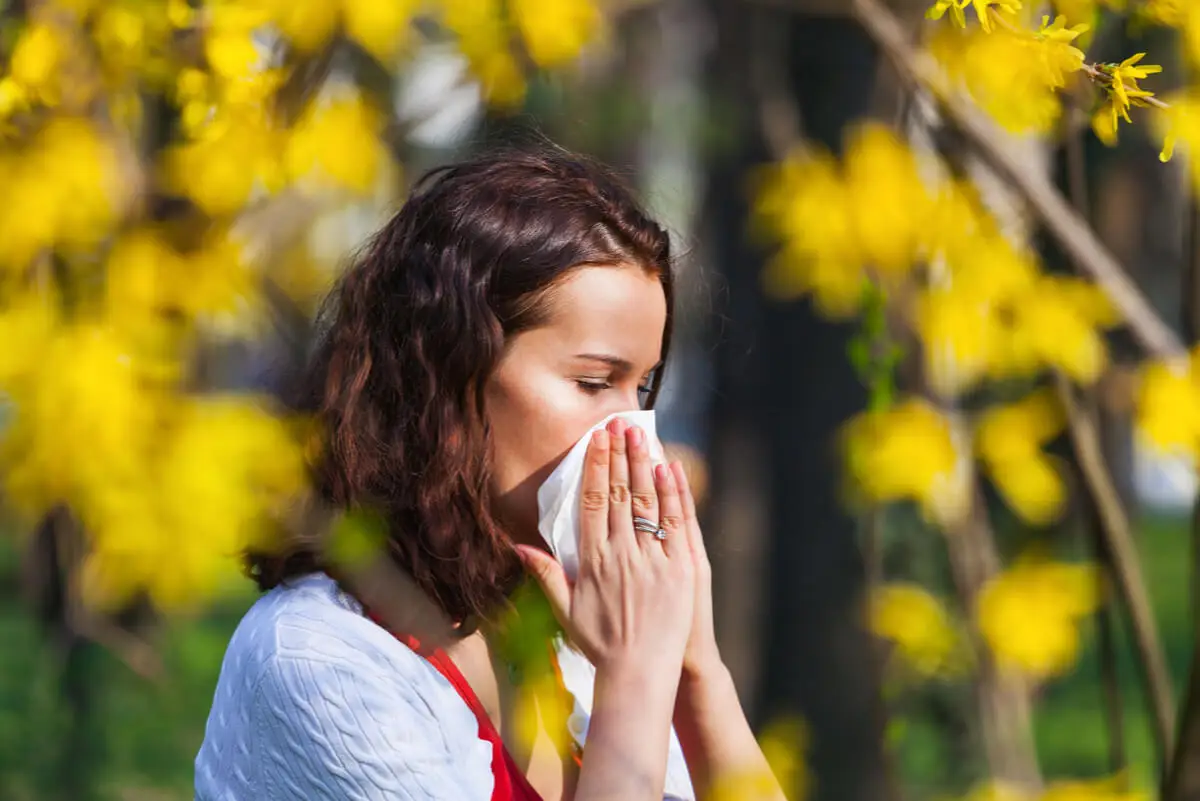Allergic Cough: How to Identify and Treat It

An allergic cough can occur when the person comes into contact with a substance (allergen) that triggers such a reaction. This varies from case to case and could be dust, dust mites, animal hairs, pollen, smoke, humidity, or mold.
It’s sometimes accompanied by other symptoms, such as postnasal drip, sneezing and tearing. Treatment includes the use of antihistamines, although some home remedies can also be applied, provided the doctor authorizes it.
Although it isn’t usually serious, it is important to consult a health professional, especially when there’s a history of allergic cough.
What is allergic cough?
Coughing occurs when there’s stimulation of neuronal endings in the central and peripheral nervous system, as well as in the bronchial smooth muscle. It can be a response to irritant, inflammatory, or mechanical stimuli.
In general, it’s a defense mechanism against agents that must be expelled from the respiratory tract. To do this, the lungs concentrate a certain amount of air that they expel outwards in a spasm.
Although it’s often associated with colds and other respiratory tract conditions, such as asthma and chronic obstructive pulmonary disease (COPD), there’s also an allergic cough which is separate from this. It’s what occurs when we come into contact with substances of various types (allergens), from dust and smoke to pollen, mold and animal hair.
Keep reading: Blood When Coughing or Spitting: When to Seek Help
Main symptoms
An allergic cough has some particular characteristics that help to identify it, differentiating it from the one produced by colds or other causes.
- It’s a dry cough, without phlegm. Although there are times when it’s accompanied by nasal or bronchial secretion, producing expectoration and expulsion of this phlegm.
- It’s usually very persistent. When it starts, it’s difficult to calm it down. There are attacks that persist for a period of time (several minutes), during which the person seems to be choking.
- It may occur several times a day, especially in the presence of the allergen, although at night it usually intensifies. This is because, being in the supine position, the posterior nasal drip is increased and the allergic cough reflex is stimulated.
Other respiratory allergy symptoms, such as rhinorrhea and sneezing, aren’t always present. However, it isn’t uncommon for people with rhinitis or sinusitis to have episodes of allergic cough.

Possible causes of an allergic cough
As mentioned, an allergic cough occurs when the person comes into contact with a substance that, for them, is an allergen. Let’s have a look at the main agents that trigger this reaction:
- Household dust when cleaning
- Pollen from plants, which intensifies in spring
- Fungi and mold, especially when there are high levels of humidity
- Animal hair and dander (dogs, cats, rodents)
- Bird feathers (especially birds in cages)
- Strong perfumes
- Chlorine from swimming pools or for cleaning
- Disinfectants, detergents and other household products
- Air conditioners (dirty filters with dust and mold)
- Cigarette smoke or smoke from burning (fireplaces, barbecues)
- Dust from construction and other industrial activities
- Environmental pollution in general
It’s considered that people with a family history are more likely to develop an allergic cough.
Further reading for you: The 5 Best Natural Remedies for Pollen Allergies
Treatment of allergic cough
The main thing is to identify the cause, that is, the possible allergen that causes it, with a view to preventing further episodes. In this regard, it’s important to see an allergist or a pulmonologist, both to perform an allergy test and to rule out an underlying respiratory problem.
In addition, the physician may recommend some medications to alleviate the symptoms:
- Loratadine: Antihistamine in syrup or tablets, for adults or children over 2 years old.
- Dexchlorpheniramine: Antihistamine and anticholinergic, recommended for hay fever or urticaria.
- Clobutinol: A cough suppressant. It’s sold in combination with doxylamine, which is an antihistamine. It’s also used to combat insomnia.
- Dextromethorphan: Another cough suppressant and antitussive.
- Nasal irrigators or inhaled corticosteroids.
Other measures
In addition to the above-mentioned medications, some measures can be taken to relieve or prevent an allergic cough. Among these general recommendations are the following:
- Drink enough water to keep the mucous membranes hydrated, mainly the pharyngeal mucosa.
- Nasal washes with saline solution.
- Not smoking or being in contact with people who smoke.
- Avoiding exposure to smoke.
- Wearing a mask or chinstrap when cleaning.
- Keeping pets out of the room.
- Using hypoallergenic sheets, mattresses, and pillows.
- Not using perfumes.

Home remedies for allergic cough
Whenever authorized by the doctor, some home remedies can be used to combat or alleviate allergic cough:
- Carrot or oregano syrup with honey: This has antitussive properties.
- Peppermint or mint tea: Besides being antitussive, it’s decongestant, expectorant and mucolytic.
- Honey syrup with propolis: This comes already prepared or you can make it at home, mixing both ingredients in equal parts.
- Ginger root: This has anti-inflammatory properties. It can be taken in syrup form, by chewing a piece of root, or by preparing an infusion with honey and lemon.
- Pineapple: Contains bromelain, which has anti-inflammatory and mucolytic properties.
- Thyme: Relieves bronchial cough. It comes in syrup form or can be prepared as an infusion.
When to see a doctor
An allergic cough is more than just a nuisance. It often affects how you carry out your daily activities, at home or at work, as well as the people around you.
You should go to a medical center or consult a pulmonologist if the allergic cough persists for a week, if it worsens, or if symptoms such as fever, difficulty breathing, or the presence of thick and difficult mucus, especially if it’s bloody.
In addition to this, people with a history of COPD, asthma, bronchitis, or other chronic respiratory conditions should be very attentive to these and other symptoms in order to avoid possible complications.
All cited sources were thoroughly reviewed by our team to ensure their quality, reliability, currency, and validity. The bibliography of this article was considered reliable and of academic or scientific accuracy.
- Amat F, Bourgoin-Heck M, Lambert N, Just J. Alergia respiratoria en el niño, EMC – Pediatría. 2018; 53(4): 1-8.
- Angeletti E. Eficacia de la miel para el tratamiento de la tos aguda en niños atendidos en forma ambulatoria. Evidencia, Actualizacion En La práctica Ambulatoria. 2020; 23(4): e002075. https://doi.org/10.51987/evidencia.v23i4.6887.
- Brunekreef B, Groot B, Hoek G. Pets, Allergy and Respiratory Symptoms in Children. International Journal of Epidemiology. 1992; 21(2): 338–342.
- Machado-Alba, J, Moreno Gutiérrez P, Bañol A. Patrones de prescripción de broncodilatadores y corticoides inhalados en pacientes adultos de Colombia. Acta Médica Colombiana. 2015; 40(3): 218-226.
- Mancilla Ávila O. Relación entre los niveles altos de contaminantes del aire y la prevalencia de síntomas de alergia respiratoria en adolescentes de Monterrey. México: Universidad Autónoma de Nuevo León, 2019.
- Sánchez López J. Interrelación entre la alergia alimentaria y la alergia respiratoria mediada por proteínas de transferencia de lípidos. Barcelona – España: Universitat de Barcelona, 2014.
- Sureda Gomila A. Beneficios del consumo de jengibre en personas con asma bronquial. Palma: Universitat de les Illes Balears, 2018.
- Terán L, Haselbarth-López M, Quiroz-García D. Alergia, pólenes y medio ambiente. Gac Med Mex. 2009; 145(3): 215-222.
This text is provided for informational purposes only and does not replace consultation with a professional. If in doubt, consult your specialist.








